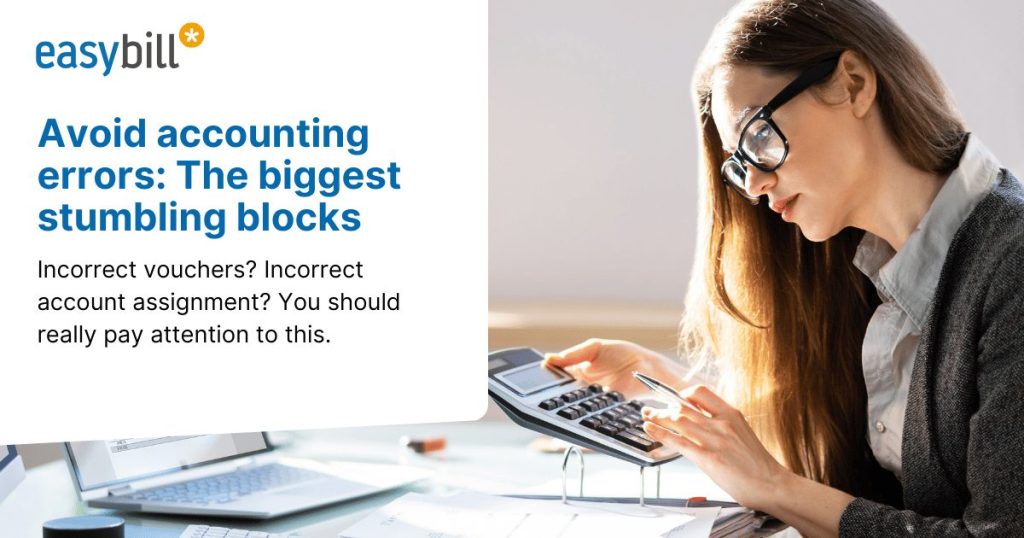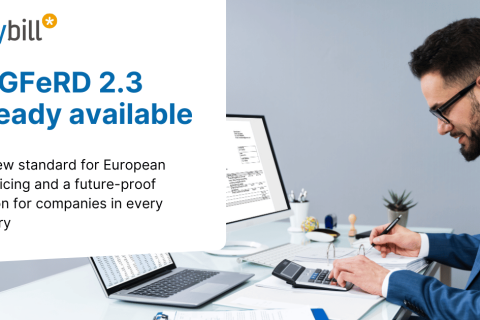
For many entrepreneurs who do their own bookkeeping, financial administration can be a real challenge. Keeping an eye on the figures and documenting them correctly is crucial for the long-term success of the company. Errors in bookkeeping often creep in unnoticed and can have serious financial and legal consequences.
In this article, we will show you which common accounting errors occur and how you can avoid them. You will also find out what to do if an error has nevertheless crept in.
Common accounting errors – Our top 5
If you are a business owner who takes your bookkeeping into your own hands, you are probably no stranger to the classic sources of error. Here is an overview of the most common stumbling blocks:
- Incomplete or incorrect supporting documents
Missing or incomplete receipts are one of the most common errors in accounting. It can easily happen that receipts are lost or invoices are not filed correctly. Incorrect or missing receipts often mean that business transactions are not recorded correctly, which can cause problems during a tax audit. - Incorrect account assignment of business transactions
There are countless accounts in bookkeeping and business transactions must be allocated to the correct account. Many entrepreneurs make the mistake of assigning income or expenses incorrectly, which can distort the balance sheet and income statement. - Incorrect recording of sales tax
The correct recording of VAT is crucial. Common errors include not recording input tax amounts, incorrectly stating VAT on outgoing invoices or improperly handling tax exemptions and small business regulations. - Overlooked depreciation
Fixed assets that have to be depreciated are often forgotten. This leads to incorrect information in the annual financial statements and therefore also has a negative impact on the tax calculation. - Confusion between private and business expenses
Sole traders and freelancers in particular often mix private and business expenses. Such errors can cause problems during a tax audit and lead to unpleasant additional payments.
How to avoid accounting errors
Avoiding errors in accounting requires a systematic approach and a clear structure. The following measures will help you to reduce accounting errors:
- Careful document management
Orderly and complete document management is the be-all and end-all of any bookkeeping system. You should ensure that every receipt is recorded and archived correctly. Digital document systems are a great advantage here, as they not only save time but can also reduce the error rate. Even better is software that covers both incoming and outgoing receipts to collect everything in one place. - Regular reconciliation of accounts
Check your accounts regularly for accuracy. A monthly reconciliation of your bank account, cash book and posted business transactions can help to identify irregularities at an early stage. And if you do reach your limits, you should take the step of seeking tax advice. - Clear separation of private and business expenses
Keep separate accounts for private and business expenses. Avoid cash payments if possible, as these are often difficult to track. - Ongoing training
The legal situation in the area of accounting and taxes is constantly changing. It is therefore advisable to undergo regular training in order to be aware of current regulations and avoid mistakes. - Using software for accounting
Modern accounting and invoicing software offers you numerous options for automation and plausibility checks. This not only saves you time, but also significantly reduces the susceptibility to errors.
Correcting errors in accounting
Even with the greatest care, it is not always possible to avoid errors creeping in. It is important to recognize them early and correct them correctly. Here are a few steps to help you do this:
- Analyze errors
Identify the cause of the error. Was it a document that was posted incorrectly? Was a VAT item not handled correctly? A precise analysis will help you to avoid similar errors in the future. - Making retroactive corrections
In accounting, it is usually possible to make corrections retrospectively. You should make sure that the correcting entries are traceable. Keep a written record of why and how a correction was made. Particularly with regard to the GoBD, your software should comply with all guidelines and only offer corrections if they are tracked and implemented correctly for tax purposes. - Cooperation with a tax consultant
Even if you do the bookkeeping yourself, it can make sense to consult a tax consultant if serious errors occur. A tax consultant can help you correct errors and communicate with the tax office. - Use accounting software
Many accounting programs offer automatic checks and reports that show you whether postings are implausible or incorrect. Use these functions regularly to detect errors at an early stage.
easybill supports you with preparatory bookkeeping
As an entrepreneur who takes bookkeeping into your own hands, you face challenges that can affect the financial health of your company. Accounting errors are not uncommon, but you can counteract them with the right approach and appropriate measures. Pay attention to careful record keeping, regular audits and use the technical tools available to you.
Accounting errors are no reason to panic, but they do require consistent action. By correcting errors and sustainably optimizing your accounting processes, you create the basis for a solid financial foundation and avoid problems with the tax office.
By organizing your bookkeeping systematically and thoroughly, you can not only minimize errors, but also focus on what really matters: Developing your business successfully.
easybill supports you in your project: by organizing incoming and outgoing documents, the pre-assignment option, extensive evaluations and exports to DATEV and Lexware Office, you have so many features at your fingertips that you have enough time for other things in your day-to-day work. Take advantage of automation and, above all, GoBD-compliant invoicing software.
Read also:
E-invoice 2025: current information for entrepreneurs
One Stop Shop (OSS) – What does that mean?
ZUGFeRD – the new standard for European e-invoicing




